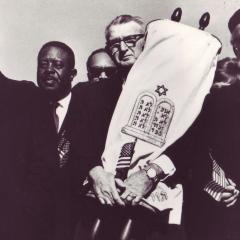
The Right to be Free
Once again this year, a notable confluence of the secular and Jewish calendars brings the start of the birthday weekend of Rev. Dr. Martin Luther King, Jr. together with our celebration of Shabbat Shira (the “Shabbat of Song”). Shabbat Shira commemorates the joyful song (shir) of freedom sung by the Israelites after crossing the Reed Sea. The words of the Shira, found in Exodus 15, are among the most ancient of the entire Bible, and are chanted with a special melody woven into the regular Shabbat trope. Listen Here.
The Book of Exodus has offered inspiration to countless generations of oppressed peoples yearning for liberation, particularly the African American community. During the civil rights movement, many Jews were deeply stirred by this common heritage, including Rabbi Abraham Joshua Heschel. As his daughter, Susanna, wrote:
At his first major address on the subject, at a conference on Religion and Race sponsored by the National Conference of Christians and Jews in Chicago on January 14, 1963, the occasion where Heschel and King first met, Heschel opened his speech by returning the present day to biblical history: "At the first conference on religion and race, the main participants were Pharaoh and Moses....The outcome of that summit meeting has not come to an end. Pharaoh is not ready to capitulate. The exodus began, but is far from having been completed. In fact, it was easier for the children of Israel to cross the Red Sea than for a Negro to cross certain university campuses." (Praying with their Feet: Remembering Abraham Joshua Heschel and Martin Luther King, Peacework Magazine, Issue 371, December 2006-January 2007)
Numerous clergy and lay people from our Reform movement joined Heschel in the 1960’s struggle for civil rights. Founded on the ideals of prophetic Judaism, our movement has for decades been a vocal advocate of social justice, frequently led by its lobbying arm, the Religious Action Center. Most appropriately then, this same weekend has been designated Shabbat Tzedek—a Shabbat of Justice—as we all celebrate with the RAC its 50 years of efforts to ensure that the United States is indeed a country of liberty and justice for all.
Many of those raised in our movement, particularly during the social upheavals of the 1960’s and 70’s, have been greatly influenced by the emphasis on social justice, and none more than Doug Mishkin. Doug is a lawyer by vocation, but since his days as a songleader in the 1970’s at our URJ Kutz Camp, has also been a respected singer-songwriter whose work often highlights examples of intolerance. His “Make Those Waters Part” movingly recounts the connection between the biblical narrative and the struggle against racism in this country. Listen Here.
Cantor Erik Contzius, another product of the Reform movement, created a unique arrangement of “We Shall Overcome” paired with Mi Khamocha, along with the “shira” melody for Shabbat Shira, and words from Martin Luther King, Jr.’s “I Have a Dream” speech. “The result,” Cantor Contzius says, “is a moment of shared redemption: both from Egypt and from racial oppression.” Listen Here.
Peri Smilow’s song “One Small Step” is part of her Freedom Music Project, and beautifully integrates her background as a community organizer with her skills as a songwriter. Sung by Jews and African-Americans in this recording, "One Small Step" relates the fateful “one small step for freedom” of Nakhshon ben Aminadav—who, according to the Midrash, was first into the waters of the Reed Sea, leading the Israelites across. Listen Here.
As we join together this year to honor Dr. King, we are mindful that with the first African-American president in the White House, this nation has come a long way. But Dr. King’s dream is not yet fully realized for far too many, and his statement, “justice denied anywhere diminishes justice everywhere” still resonates powerfully. Let us therefore be resolute in our pursuit of justice, ever inspired by Dr. King and the enduring teachings of our Jewish tradition.
Photograph provided by the Religious Action Center.
The photograph of Rev. Dr. Martin Luther King, Jr., Rabbi Maurice Eisendrath, and Rabbi Abraham Joshua Heschel is emblematic of the relationship between the Jewish and Black communities during the Civil Rights Movement. It was taken in 1965 in Montgomery, Alabama at the conclusion of the famous march for voting rights from Selma to Montgomery. Rabbi Maurice Eisendrath, a tremendous figure in American Reform Judaism, who served as the Union for Reform Judaism’s President from 1943 until 1972, and who was very much of a spiritual partner to Rev. Dr. Martin Luther King in the struggle against racism, can be seen carrying the Torah in this photo. He provided an invocation at a rally that occurred at the conclusion of the March. Next to him is Rabbi Abraham Joshua Heschel, one of this century’s great religious figures and a close colleague of Rev. Dr. Martin Luther King Jr. When referring to this March, Rabbi Heschel declared , “When I marched in Selma, it felt like my legs were praying.”

